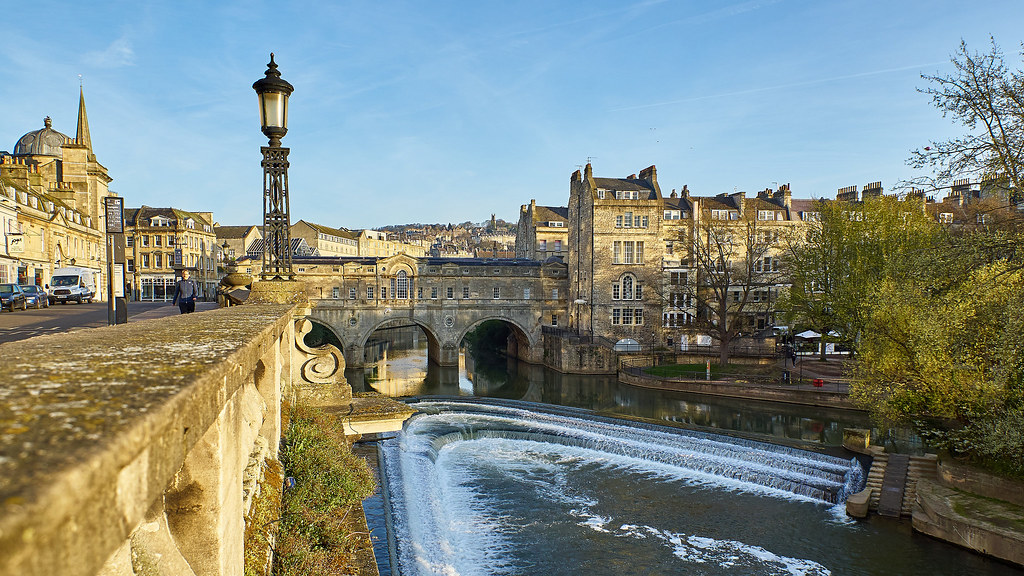James Copestake is Professor of International Development, Director of the Centre for Development Studies, and Director of Studies for the Institute for Policy Research (IPR) Professional Doctorate in Policy Research and Practice at the University of Bath.
On 15 December more than 100 people joined a Zoom meeting to discuss prospects for Bath beyond 2020. This marked the launch of a situation report entitled “Bath Beyond 2020: creating a resilient economy together” jointly authored by IPR and The Good Economy.
At the launch, Vice-Chancellor of the University of Bath, Professor Ian White, Mark Hepworth (The Good Economy), and Dr Charlie Larkin (IPR), were joined by Chair of Bath Royal United Hospital, Alison Ryan, and BANES Director of Partnerships and Corporate Services, David Trethewey, to discuss the report and its findings. This prompted a rich set of questions and comments. These have been merged below into a single joint narrative, organised under three broad headings: ‘trends’ (how things currently are), ‘values’ (what matters for the future), and ‘actions’ (who can and should do what next).
Trends
Genuinely affordable housing and transport are both key to moving things forward for Bath. Increasingly people who work in low paid jobs in Bath cannot afford to live here and so have to live outside and travel in. High costs contribute to inequality – Bath is the third most polarised local authority in the UK. Public funding has not been sufficient to address these issues.
Health care and climate change innovation are growth sectors, but what particular strengths can Bath build on in these sectors better than other places? What unique tangible market advantages do we have – for example, in the creative and hospitality sectors? Can we capitalise more on Bath's historical health and wellbeing heritage to promote more health-related services such as rehabilitation, anti-ageing, aesthetics, medical tourism, medical devices, wellness, inclusive social care, and contract research? These are relatively clean industries, consistent with strong local demand to protect an attractive environment, our hospitality industry and an ageing population. There is also scope for synergy between our excellent universities and hospitals to become a health hub.
Bath has a long history of developing visions which are never realised. How can we change this? COVID-19 seems to be driving several initiatives, but who will pull this together and how? The UK still has a very centralised system of government. Coordination between local actors is going to be important to keeping Whitehall and Westminster onside with what we are doing and adapting flexibly to central government policy and funding initiatives.
The long history of private enclosure and exclusion of land and space is a further obstacle to collective action. This is a UK wide problem (as explored by Guy Shrubsole in an IPR lecture earlier in the year). Nick Hayer's 'Book of Trespass' estimates that 92% of land space is exclusionary in the UK. But it’s especially evident in Bath. The city has a long history of inequality and exclusion, particularly of people living in the Somer Valley, Twerton, Southdown and Whiteway.
Values
Climate change, COVID-19 and loss of community cohesion all highlight the need for decision-making based on more than profitability and a narrow interpretation of shareholder interests. One opportunity here may be to make more use of the 17 Sustainable Development Goals (SDGs) for 2030 to maintain a holistic perspective, and one that also emphasises the interdependence of Bath's stakeholders, particularly in adapting to climate change.
Featuring the SDGs may also be one way of engaging with students and young people, particularly in the wake of Brexit. We are fond of bragging about the UNESCO World Heritage City status of buildings, but how do we do compared to other places when it comes to the wellbeing of inhabitants and the environment against UN agreed benchmarks?
We need to train more young people in the areas where we have skills gaps, but we also need to do much more than that – for example, by making it easier for those who have grown up and/or studied in Bath to stay on here and start their own business activities. Both health and climate change innovation require skills which are in short supply in the West and beyond, for example software development. How can we build a training/teaching economy in support of priority sectors of health and climate change innovation?
The city and surrounding areas also needs to do more to bring into the open persistent and pervasive problems of social discrimination and racism. The combination of changing attitudes among young people and the COVID-19 crisis create openings for unwinding centuries of complacent acceptance of Bath history, one tangible outcome from which could be the sort of equality that would support better health outcomes. A small but symbolic starting point here would be to give 25% of tickets sales from Beckford's Tower to support BAME activities in the city. How many people in the city know about Fairfield House, let alone celebrate it alongside Prior Park Gardens and the rest?
COVID-19 should also prompt us to remember people with disabilities, and those who are homeless and/or socially isolated.
Institutions
It is excellent that more thinking is happening about the future of Bath. But we’ve been here before many times. How are we going to get from ‘should’ to action? Who is going to drive it, with what plan, timescale, measurement and resources? Bath needs a champion, a body with competence and clout to create cluster strategies – maybe more than one. The city has numerous moving parts. We need one or more new initiatives or bodies through which different ‘anchor institutions’ can co-create a longer-term vision, and demonstrate collective agency and responsibility. There’s a role here not only for the two Universities, RUH, Curo and the Council, but also for financial institutions and banks. However, it’s also important to include inputs from across the social spectrum and reflect the full diversity of the city if whatever happens is to leave nobody behind.
The UK is too accustomed to seeking itself as a source of ideas, rather than learning from innovations in other parts of the world. Are we missing a trick? How best to learn lessons from abroad? What can we learn, for example, from the city of Freiburg in Southern Germany? It was a coalition of their University, local industry and local government that helped it reinvent itself as a centre for green development. Both are historic cities with an important tourist sector. Other cities in the UK are also building similar coalitions. Bristol, for example, already has a ‘One City Plan’ elaborated by the local authority in collaboration with businesses, anchor institutions and other key stakeholders. Growing awareness of the climate crisis creates a new opportunity for Bath to do something similar.
Learn more about ‘Bath beyond 2020’, watch the launch event online, or read the report in full.
All articles posted on this blog give the views of the author(s), and not the position of the IPR, nor of the University of Bath.
Respond




